Related Research Articles

Ataullah Mengal was a Pakistani politician and feudal figure. He was the head of the Mengal tribe until he nominated one of his grandsons, Sardar Asad Ullah Mengal, as his tribal successor. He was also the 1st Chief Minister of Balochistan during Zulfikar Ali Bhutto's premiership from 1 May 1972 to 13 February 1973. He died on 2 September 2021 in Karachi.
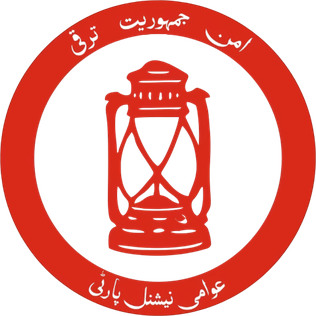
The Awami National Party is a Pashtun nationalist, secular and leftist political party in Pakistan. The party was founded by Abdul Wali Khan in 1986 and its current president is Asfandyar Wali Khan, grandson of Bacha Khan, with Mian Iftikhar Hussain serving as the Secretary-General. Part of the PPP-led cabinet of the Pakistani government during 2008−13, ANP's political position is considered left-wing, advocating for secularism, public sector government, and social egalitarianism.

The Balochistan National Party or Balochistan National Party (Mengal) (Urdu: بلوچستان نيشنل پارٹی ; Balūcistāna Nēśanala Pārtī ) is a political party in Balochistan, Pakistan. BNP believes in more provincial rights and greater autonomy for Baluchistan province through peaceful and democratic struggle.
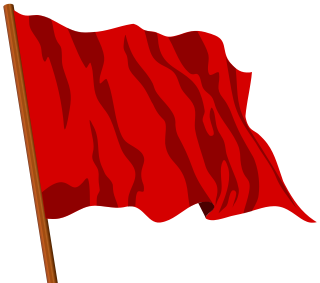
The Wali Khan faction of the National Awami Party was formed after the 1967 split in the original NAP between Maulana Bhashani and Abdul Wali Khan. The Wali Khan faction was later named National Awami Party (NAP) after the independence of Bangladesh.

The Pashtunkhwa Milli Awami Party, abbreviated as PMAP or PKMAP, is a political party in Pakistan's Balochistan province. It was founded by Mahmood Khan Achakzai, who was elected as the chairman, and Sher Ali Bacha, who served as the General Secretary, in March 1989 in Quetta.

Ghaus Bakhsh Bizenjo was a Pakistani politician from Balochistan. He served as the 3rd Governor of Balochistan.

The Sindhudesh Movement is a separatist movement, based in Sindh, Pakistan, seeking to create a homeland for Sindhis by establishing an ethnic state called Sindhudesh, which would be either autonomous within Pakistan or independent from it.
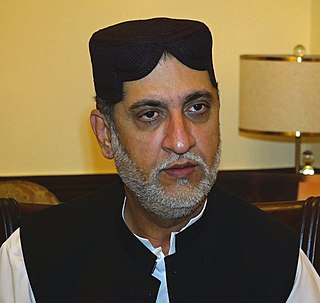
Akhtar Mengal is a Pakistani politician from Balochistan who is the chairman of Balochistan National Party (Mengal). He previously served as the Chief Minister of Balochistan between 1997 and 1998 and later he served as a member of the Balochistan Provincial Assembly. Mengal also served as a member of National Assembly of Pakistan from August 2018 till August 2023.
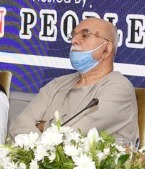
Mahmood Khan Achakzai is a Pakistani Pashtun regionalist politician who is the Chairman of Pashtunkhwa Milli Awami Party. Achakzai completed his Engineering degree from the Peshawar University of Engineering and Technology. In 7th National Congress of Pashtunkhwa Milli Awami Party on 19, 20 December 2022 Mahmood khan Achakzai re elected as the Chairman Of PkMAP.
The Baloch Students Organization is a student organisation that campaigns for the students of Pakistan's Balochistan Province. It was founded as a student movement on 26 November 1967 in Karachi and remains the largest ethnic Baloch student body in the country. It got divided due to ideological differences. BSO Pajjar and BSO Mohiuddin are affiliated with the parliamentary framework of Pakistan. Dr Allah Nazar, founder of pro independence wing, in 2002 while he was studying in college, created a breakaway faction — BSO–Azad — that advocated struggle for an independent Balochistan based on pre-colonial Baloch country. The Pakistani government banned the BSO Azad on 15 March 2013, as a terrorist organisation.
There are or have been a number of separatist movements in Pakistan based on ethnic and regional nationalism, that have agitated for independence, and sometimes fighting the Pakistan state at various times during its history. As in many other countries, tension arises from the perception of minority/less powerful ethnic groups that other ethnicities dominate the politics and economics of the country to the detriment of those with less power and money. The government of Pakistan has attempted to subdue these separatist movements, which have included those in Bangladesh, the Baloch Liberation Front (BLF) in Balochistan; the "Sindhudesh" movement in Sindh province; "Balawaristan" in Gilgit-Baltistan; Jinnahpur and Muhajir Sooba movement for muhajir immigrants from India.

Sindhi nationalism is an ideology that claims that the Sindhis, an ethnolinguistic group native to the Pakistani province of Sindh, form a separate nation. After Bangladesh became independent in 1971, G.M. Syed gave a new direction to nationalism and founded the Jeay Sindh Mahaz in 1972 and presented the idea of Sindhudesh; a separate homeland for Sindhis. G.M. Syed is considered as the founder of modern Sindhi nationalism. However, Sindhi nationalists stand divided upon the idea of a separate country or autonomy within Pakistan.

Awami Tahreek or Qaumi Awami Tehreek, formerly Sindhi Awami Tahreek, is a Marxist–Leninist–Maoist political party based in the Pakistani province of Sindh, and headquartered in Hyderabad.
Sindhiani Tahreek is a women-led political organization formed by rural women in Sindh, the southern province of Pakistan.
Muhammad Usman Khan Kakar, also known as Usman Lala, was a Pakistani politician and senator of the Pashtunkhwa Milli Awami Party (PMAP). He was an activist in the Pashtun Tahafuz Movement (PTM). He was a member of the Senate of Pakistan from 2015 to 2021.

Mohsin Javed Dawar is a Pakistani politician who is the chairman of the National Democratic Movement (NDM). He had been a member of the National Assembly from August 2018 till August 2023. He is the co-founder of a human rights movement, Pashtun Tahafuz Movement (PTM). He has formerly served as president of the National Youth Organisation (NYO) and the Pashtun Students Federation (PSF), the allied wings of the Awami National Party (ANP).
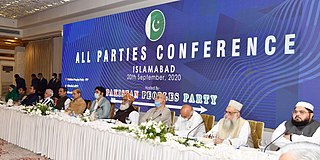
The Pakistan Democratic Movement, or PDM, is a coalition of political parties in Pakistan. It was founded in September 2020 as a movement against the prime minister Imran Khan, accusing his regime of poor governance, political victimisation of opponents, and mismanaging the economy and foreign policy. The struggle was also joined by several dissident members of Khan's own party, Pakistan Tehreek-e-Insaf (PTI). On 10 April 2022, the coalition succeeded to oust Khan through a no-confidence motion, after which the PDM formed its own government, choosing the opposition leader Shehbaz Sharif as the country's prime minister.
Alya Bakhshal is a Pakistani feminist, political worker and organizer. She is general secretary of the Women Democratic Front and women secretary of Awami Workers Party, Sindh.
Yousuf Mustikhan was a Pakistani politician who was the president of the Awami Workers Party.
Akhtar Hussain is a Pakistani lawyer, senior advocate of Supreme Court of Pakistan and left wing political leader. He is senior vice president of the left-wing political party, Awami Workers Party. He served as the General Secretary of Awami Workers Party from 2016 to 2022. He stayed member of Pakistan Bar Council for ten years from 2010 to 2020 and elected as Vice Chairman in 2012. He was a member of the Judicial Commission of Pakistan for two years from 2019 to 2021.
References
- ↑ Kasi, Amanullah (2006-09-19). "Federation in danger, say leaders". DAWN.COM. Retrieved 2021-06-30.
- ↑ "New nationalist alliance being formed: Mumtaz". DAWN.COM. 2005-11-10. Retrieved 2021-06-30.
- 1 2 "The nationalist card | Special Report | thenews.com.pk". www.thenews.com.pk. Retrieved 2021-06-30.